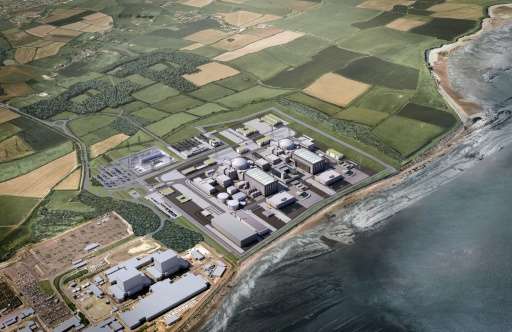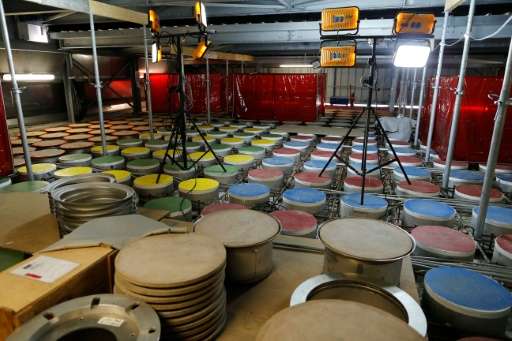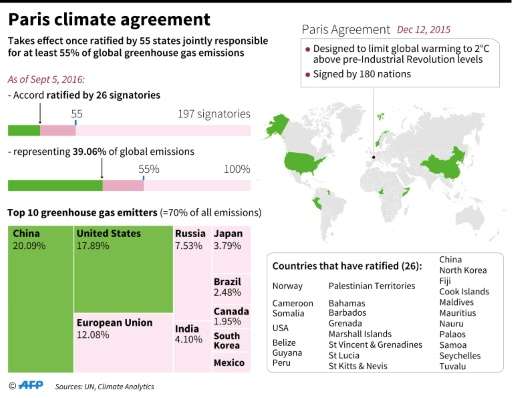Is nuclear crucial to climate change targets?

As Britain greenlights its first new nuclear power plant in more than 20 years, experts diverged Thursday on the role of nuclear energy in the quest to cap global warming at less than two degrees Celsius.
The broad challenge in meeting that goal—the cornerstone of the Paris Agreement inked in December by 195 nations—is decarbonising the world economy as quickly as possible.
"We need a global transition to primarily zero carbon energy sources by mid-century," said Rachel Cleetus, lead economist and climate policy manager for the Washington-based Union of Concerned Scientists (UCS).
Along with other think tanks and advocacy groups sounding the climate change alarm, the UCS is not a champion of nuclear power.
But with fossil fuels still accounting for 80 percent of total energy consumption, they say, the splitting or fusing of atoms—despite concerns about cost and safety—still has a role to play.
"The fewer options on the table, the greater the challenge," said Jim Williams, director of the US Deep Decarbonization Pathways Project (DDPP).
The consensus among experts trying to map that transition "is that it will be harder to meet climate goals without nuclear energy in the mix," he said by phone.
Today, 31 countries have nuclear power plants accounting for just under eleven percent of global electricity generation.
A dozen of them depend on nuclear for at least a third of their juice, including France (75 percent), along with Hungary, Slovakia and Ukraine (50 to 55 percent).

In the US that figure stands at about 20 percent, as in Britain—not counting the newly approved Hinkley Point plant, set to come on line in 2025.
Solar and wind capacity have expanded rapidly worldwide, as costs have plummeted. And several new technologies for storing the energy they generate show huge promise for rapid deployment.
But renewables still only account for a thin slice of overall energy production.
"Nuclear power is needed in conjunction with renewables to meet our obligations to reduce greenhouse gas emissions," said Juan Mathews, a visiting professor at the Dalton Nuclear Institute of the University of Manchester.
100 percent renewables
At the same time, global warming is accelerating more quickly than predicted, and its consequences are being felt more sharply, added Cleetus.
"The scope and impacts of climate change—including rising seas, more damaging extreme weather events, and severe ecological disruption—demand that we consider all possible options for limiting heat trapping gas emissions," she told AFP.
Not all climate and energy experts, however, are convinced that nuclear is crucial for keeping a lid on global warming.
"In fact, it's a barrier," said Tom Burke, chairman of London-based E3G, a climate change think tank.

"It takes away capital from things that would deliver faster, cheaper and smarter low carbon electricity systems," he told AFP.
It also runs counter, he added, to a wider trend towards decentralised, flexible power generation.
For climate analyst Martin Kaiser of Greenpeace International, "the only feasible and secure way to keep global warming well below two degrees Celsius (3.6 degree Fahrenheit) is a massive swing towards renewables."
A "100 percent" renewable energies revolution is still possible, he insisted.
For Williams, potential climate catastrophe trumps the risks associated with nuclear power—radioactive waste, accidents such as happened in Fukushima and Chernobyl—only with strict regulatory oversight in place.
He highlighted the contrast between gold-standard Switzerland and China, which has 30 nuclear plants built or under construction, and another 20 in the pipeline.
"China has relatively understaffed and undertrained regulatory authorities—that is worrisome," he said.
"Would I live next to a nuclear power plant if I thought that was really important to mitigate climate change?", he added.
"In the first case (Switzerland) I would, but in the second I wouldn't."
© 2016 AFP


















